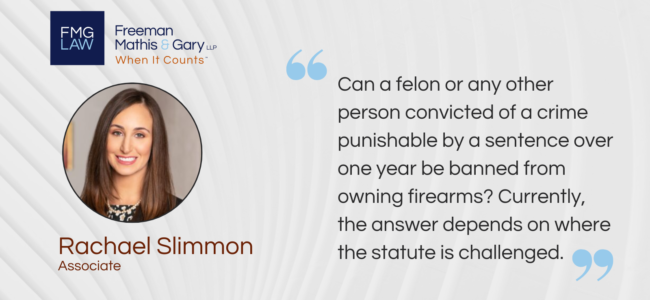BlogLine
Felons, firearms, and Federal law: a review of 2024 appellate court decisions on the constitutionality of the Federal felon-in-possession statute
1/6/25

Can a felon or any other person convicted of a crime punishable by a sentence over one year be banned from owning firearms? Currently, the answer depends on where the statute is challenged.
The federal felon-in-possession statute, 18 U.S.C. § 922(g)(1), states that it is illegal for any person “who has been convicted in any court, of a crime punishable by imprisonment for a term exceeding one year” to “possess in or affecting commerce, any firearm or ammunition.”
In 2024, Third, Fifth, Sixth, Seventh, Eighth, and Eleventh Circuit Courts of Appeals considered as-applied challenges to the constitutionality of 18 U.S.C. § 922(g)(1) following the Supreme Court’s decisions in New York State Rifle & Pistol Association v. Bruen, 597 U.S. 1 (2022) and United States v. Rahimi, 602 U.S. 680 (2024). The Ninth and Tenth Circuit Courts are also reconsidering the issue post-Rahimi, but have not yet issued new opinions. See United States v. Duarte, 101 F.4th 657 (9th Cir. 2024), reh’g en banc granted, opinion vacated, 108 F.4th 786 (9th Cir. 2024); Vincent v. Garland, 80 F.4th 1197 (10th Cir. 2023), judgment vacated and remanded, 144 S. Ct. 2708 (2024).
Of the appellate courts that issued opinions on its constitutionality in 2024, the Eighth and Eleventh Circuit Courts found § 922(g)(1) constitutional in all applications. United States v. Jackson, 110 F.4th 1120 (8th Cir. 2024); United States v. Dubois, 94 F.4th 1284 (11th Cir. 2024). Creating a split in the circuits, the Third, Fifth, Sixth, and Seventh Circuits found that the statute was not constitutional in all applications.
In United States v. Diaz, 116 F.4th 458 (5th Cir. 2024), the Fifth Circuit Court of Appeals ruled that the statute was not constitutional for all felons, because the government had to prove that its application was in line with America’s “longstanding tradition” to disarm a person with an analogous criminal history. The Fifth Circuit found that if an offense was a capital crime at the time of America’s founding, then the “lesser” punishment of permanent disarmament was permissible.
In United States v. Williams, 113 F.4th 637 (6th Cir. 2024), the Sixth Circuit held that § 922(g)(1) is constitutional on its face and as applied to dangerous people. The Court held that legislatures can legally ban felons from possessing firearms, but the felons must have the opportunity to make and prove that they are not dangerous. Unlike other courts, the Sixth Circuit rejected the argument that the government has the burden of proving that disarming a particular citizen is consistent with historical tradition. Rather, the Sixth Circuit placed the burden on individual defendants to show they are not dangerous.
The Third Circuit Court of Appeals ruled in Range v. Attorney General United States of America, — F.4th –, No. 21-2835, 2024 WL 5199447 (3d Cir. Dec. 23, 2024), that the statute was unconstitutional as applied to a man convicted in 1995 of falsely underreporting his income in a food stamps application. The Court ruled that the government did not meet its burden to prove that applying § 922(g)(1) to the defendant would be “consistent with the Nation’s historical tradition of firearm regulation,” because the Court found a historical basis to disarm only dangerous criminals.
In United States v. Gay, 98 F.4th 843, (7th Cir. 2024), reh’g denied, No. 23-2097, 2024 WL 3816648 (7th Cir. Aug. 14, 2024), the Seventh Circuit acknowledged that there may be “some room for as-applied challenges,” but did not identify any rules or guidelines for a successful challenge. The Court instead focused on Bruen’s “law-abiding, responsible citizens” language, and found that the defendant’s conduct and criminal history showed he was not a “law-abiding, responsible citizen” who had a constitutional right to possess firearms.
Overall, the recent Supreme Court decisions in Bruen and Rahimi have created a circuit split regarding the constitutionality of 18 U.S.C. § 922(g)(1) as applied to individual felons as well as the grounds and method for bringing as-applied challenges. Outside of the Eighth and Eleventh Circuits, felons’ Second Amendment rights and the as-applied constitutionality of § 922(g)(1) are presently uncertain. It would appear that the Supreme Court will need to weigh in again to resolve the circuit split.
The Third Circuit opinion can be found here: https://www2.ca3.uscourts.gov/opinarch/212835pen1.pdf
The Fifth Circuit opinion can be found here: https://www.ca5.uscourts.gov/opinions/pub/23/23-50452-CV0.pdf
The Sixth Circuit opinion can be found here: https://www.opn.ca6.uscourts.gov/opinions.pdf/24a0195p-06.pdf
The Seventh Circuit opinion can be found here: https://media.ca7.uscourts.gov/cgi-bin/OpinionsWeb/processWebInputExternal.pl?Submit=Display&Path=Y2024/D04-12/C:23-2097:J:Easterbrook:aut:T:fnOp:N:3195203:S:0
The Eighth Circuit opinion can be found here: https://ecf.ca8.uscourts.gov/opndir/24/08/222870P.pdf
The Eleventh Circuit opinion can be found here: https://media.ca11.uscourts.gov/opinions/pub/files/202210829.pdf
For more information, please contact Rachael H. Slimmon at rachael.slimmon@fmglaw.com or your local FMG attorney.
Share
Save Print
